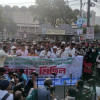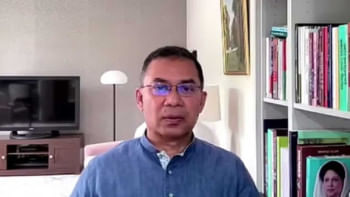Internal democracy lies at the heart of NCP charter

The National Citizen Party is set to unveil its charter this week, prioritising democracy within the organisation and presenting a vision for a "New Bangladesh" built on youth-driven decentralised governance.
The party's preamble intertwines its philosophy with three defining chapters of the nation's history—1947, 1971, and 2024.
"The year 1947 marked the beginning of our political self-assertion, 1971 was the culmination of our independence, and 2024 is our opportunity to build a new state system," reads the preamble of the 39-page draft charter.
These three historical events should be pieced together to shape a democratic, inclusive, and self-sustaining state, it adds.
The party seeks to introduce a three-term limit for its top leader, who will be elected through triennial councils.
Javed Rasin, head of the party's charter drafting committee, said, "We want to prioritise internal democracy. To that end, we have drafted the charter in a way that ensures all key leaders are elected and are held accountable."
The NCP is likely to publish the charter today, several leaders said.
The charter states that the people had to give their blood time and again to establish democracy because the core principles of the Liberation War -- democracy, equality, human dignity, and social justice -- remained unfulfilled.
People laid down their lives in the 2024 mass uprising not just to oust a government, but to dismantle a "fascist system" built on corruption, enforced disappearances, and suppression of dissent.
The year 1947 marked the beginning of our political self-assertion, 1971 was the culmination of our independence, and 2024 gave us the opportunity to build a new state system.
NCP'S GOALS, VISIONS
At the heart of the vision for "New Bangladesh" is a strong, participatory, and accountability-driven democracy where freedom of speech, voting rights, and the "freedom of organisation" are guaranteed for all, says the draft.
The party pledges to build a society eliminating all forms of economic and social discrimination and ensuring fundamental rights such as access to education, healthcare, and employment for every citizen.
The NCP envisions an efficient, transparent, and citizen-oriented administrative system which is not corrupt and wasteful.
Another core goal is the establishment of the rule of law, justice, and human rights across the country. The state will rely on science, technology, and innovation.
The NCP stresses on equal opportunities for all, regardless of religion, colour, gender, or political belief.
The party will always be vocal on issues related to the nation's independence and sovereignty.
The NCP will eliminate economic and social discrimination by ensuring access to healthcare, education, and employment for all. Special attention will be given to farmers, workers, and marginalised communities, with initiatives aimed at safeguarding their rights and improving their socio-economic conditions.
The party will press for a complete overhaul of the education sector to make the system innovation-driven and employment-oriented.
The NCP envisions a sustainable, export-oriented future economy powered by technology and agriculture.
LEADERSHIP STRUCTURE
The NCP charter refers to the individual occupying the topmost position of the party as the leader or chief. The second-highest position is the deputy leader or deputy chief, followed by the organiser.
Should the NCP win national elections and form a government, the party's leader must resign as the party chief to ensure a clear separation between governance and party operations.
If 10 percent of the national council members submit a formal request for a probe against the party chief, the political council, the highest policy-making body of the party, would form an investigation committee.
The political council must deliver a decision within 15 working days.
The other senior officeholders will be subject to the same level of scrutiny.
The political council will consist of 13 elected members, including the chief and deputy and six nominees from the top two leaders.
If the NCP forms the government, the prime minister will be added as an additional member of the political council.
To run for the political council, a candidate must be a general member of the party for at least five years and must secure backing from at least two percent of the national council delegates.
Aspirants for the positions of leader and deputy leader must be running mates and must be endorsed by at least five percent of national council members. If no panel secures 51 percent of the votes, a run-off will be held between the top two contenders.
All elected leadership positions will carry a three-year term, and a leader may not serve more than three terms.
The NCP will have a multi-layered structure.
The executive body, just below the political council, will handle the party's day-to-day affairs: formulating press strategies, campaign planning, and implementing political programmes.
The national council -- also referred to as the party's general assembly -- will comprise members from all levels of the organisation, from grassroots to the central leadership.
Five delegates from each upazila unit and 10 from each district unit will be elected to the council.
All key decisions of the party, such as budget approvals, audit report analyses, leadership elections and no-confidence motions, will be undertaken by the national council.
A simple majority is required for most decisions, but amendments to the party charter will require a two-thirds majority.
The council will convene at least once a year, with provisions for emergency meetings to be called by the leader or deputy leader.
The party also plans to establish several secretariats dedicated to key policy areas and specific demographics -- such as a women's secretariat, legal secretariat, and labour secretariat -- ensuring diverse representation and targeted mobilisation.
A three-tier regional structure will be maintained.
Although the members of the grassroot committees are being selected by the party founders now, there will be an election for top positions in the next council.
The NCP will also form an advisory panel, a parliamentary chamber, and a "shadow parliament", a concept relatively new in Bangladesh but common in Westminster-style democracies.
The shadow parliament will consist of 15 to 25 members who will mirror government ministries, scrutinise policies, and present alternative governance proposals in preparation for future elections.
At least three NCP leaders have said that no party council would be held before the next national election.
The party has yet to design its logo and flag.

 For all latest news, follow The Daily Star's Google News channel.
For all latest news, follow The Daily Star's Google News channel. 








Comments